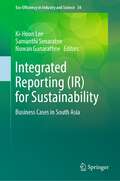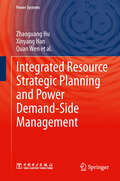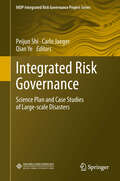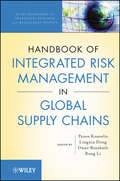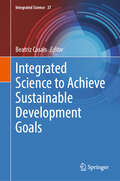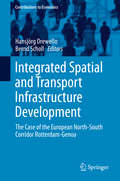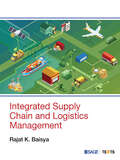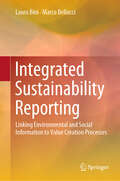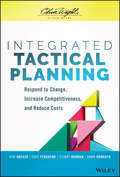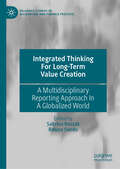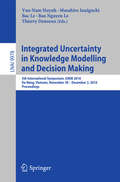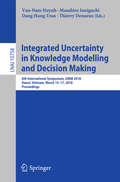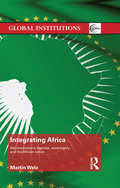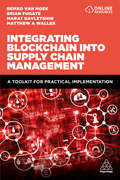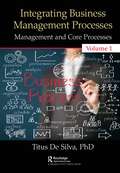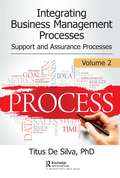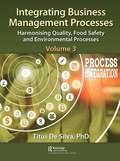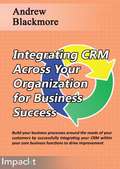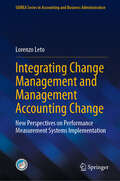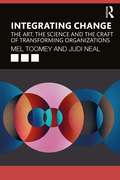- Table View
- List View
Integrated Reporting: Business Cases in South Asia (Eco-Efficiency in Industry and Science #34)
by Ki-Hoon Lee Samanthi Senaratne Nuwan GunarathneThe book presents a rich collection of research studies on the theory and practice of corporate integrated reporting (IR) in South Asia. South Asia is emerging to compete in the world marketplace and one of fast economically growing regions to contribute to the global economy. As the region’s economic development accelerates, balancing economic and environmental development appears as a key sustainability challenge for governments, investors, consumers, and local communities. Companies in South Asia region are therefore increasingly challenged to reduce their environmental impacts and to contribute to sustainable development. This book includes valuable contributions of advanced research, concepts, applications, developments and case studies on corporate IR and sustainability accounting in South Asia and the roles of different professional accounting bodies to strength corporate sustainability and build capacity in the South Asian Region.
Integrated Resource Strategic Planning and Power Demand-Side Management
by Xinyang Han Quan Wen Zhaoguang HuIntegrated Resource Strategic Planning and Power Demand-Side Management elaborates two important methods - Integrated Resource Strategic Planning (IRSP) and Demand Side Management (DSM) - in terms of methodology modeling, case studies and lessons learned. This book introduces a prospective and realistic theory of the IRSP method and includes typical best practices of DSM for energy conservation and emission reduction in different countries. It can help energy providers and governmental decision-makers formulate policies and make plans for energy conservation and emission reduction, and can help power consumers reduce costs and participate in DSM projects. Zhaoguang Hu is the vice president and chief energy specialist at the State Grid Energy Research Institute, and the head of the Power Supply and Demand Research Laboratory in China.
Integrated Risk Governance
by Qian Ye Peijun Shi Carlo Jaeger"Integrated Risk Governance: Science Plan and Case Studies of Large-scale Disasters" is the first book in the IHDP-Integrated Risk Governance Project Series. It consists of two parts: Part I: Integrated Risk Governance Project Science Plan, which outlines the challenge, research programme, outcomes, and implementation strategy of the IRG Project; and Part II: Case Studies of Large-scale Disasters, which includes case analyses of experience, lessons learned and recommendations on various large-scale disasters around the world, such as the Tangshan and Wenchuan earthquakes and the great ice storm in China, European heat waves, and Hurricane Katrina in the USA. The community model of integrated natural disaster risk governance and paradigm of catastrophe risk governance in China are also presented. Prof. Peijun Shi works at Beijing Normal University, China; Prof. Carlo Jaeger works at Potsdam Institute for Climate Impact Research, Germany; Prof.Qian Ye works at Beijing Normal University, China.
Integrated Risk Management in Global Supply Chains
by Panos Kouvelis Lingxiu Dong Onur Boyabatli Rong LiA comprehensive, one-stop reference for cutting-edge research in integrated risk management, modern applications, and best practices In the field of business, the ever-growing dependency on global supply chains has created new challenges that traditional risk management must be equipped to handle. Handbook of Integrated Risk Management in Global Supply Chains uses a multi-disciplinary approach to present an effective way to manage complex, diverse, and interconnected global supply chain risks. Contributions from leading academics and researchers provide an action-based framework that captures real issues, implementation challenges, and concepts emerging from industry studies. The handbook is divided into five parts: Foundations and Overview introduces risk management and discusses the impact of supply chain disruptions on corporate performance Integrated Risk Management: Operations and Finance Interface explores the joint use of operational and financial hedging of commodity price uncertainties Supply Chain Finance discusses financing alternatives and the role of financial services in procurement contracts; inventory management and capital structure; and bank financing of inventories Operational Risk Management Strategies outlines supply risks and challenges in decentralized supply chains, such as competition and misalignment of incentives between buyers and suppliers Industrial Applications presents examples and case studies that showcase the discussed methodologies Each topic's presentation includes an introduction, key theories, formulas, and applications. Discussions conclude with a summary of the main concepts, a real-world example, and professional insights into common challenges and best practices. Handbook of Integrated Risk Management in Global Supply Chains is an essential reference for academics and practitioners in the areas of supply chain management, global logistics, management science, and industrial engineering who gather, analyze, and draw results from data. The handbook is also a suitable supplement for operations research, risk management, and financial engineering courses at the upper-undergraduate and graduate levels.
Integrated Science to Achieve Sustainable Development Goals (Integrated Science #37)
by Beatriz CasaisThe book &‘Integrated Science to achieve Sustainable Development Goals&’ debates how different fields of study can confront or mitigate problems or contribute together to the development of society. In brief, it is a book about the interdisciplinarity of knowledge surrounding the topics in society that are involved in the world development agenda. There is an increasing recognition of the importance of achieving the sustainable development goals (SDGs) set in the UN agenda 2030. The book seeks to address the need for the integration of multidisciplinary fields of knowledge to achieve the seventeen SDGs. The book was developed with contributions from established and well-known scholars in different fields. It is interdisciplinary in nature and international in scope, intending to bring out a collection of state-of-the-art/cutting-edge knowledge on policies to achieve the 17 SDGs as well as a range of actionable recommendations for future developments in the different fields with the purpose of addressing the Agenda 2030. The integration of different disciplines (including sociology, health, education, psychology, business, economics, political science, environmental studies and urban planning) in a complex problem like societal development gives this book the challenge to be an authoritative tool with guidelines for the entire community and for policymakers as well. Each chapter presents the state of the art of a topic considered important to achieve SDGs. The authors explain how their field contributes to the achievement of one or more SDGs, including the main theories and examples of empirical evidence that may guide society in using such knowledge to contribute to societal impact.
Integrated Spatial and Transport Infrastructure Development
by Bernd Scholl Hansjörg DrewelloThe challenge of growth in transport, especially in freight transport, and scarce resources in money, landscape and local opposition against new infrastructure investment require new solutions from transport policy. This book deals with these issues taking as an example the transport corridor Rotterdam-Genoa, one of the most heavily used in Europe. In 2010 the INTERREG project Code24 with partners from five European countries started with the aim to develop a transnational strategy to strengthen and to develop the corridor. The main objective was to accelerate and jointly develop the transport capacity of the entire corridor by ensuring optimal economic benefits and spatial integration while reducing negative impacts on the environment at local and regional level. These issues are highlighted in the book from an interdisciplinary perspective, taking into account spatial, economic, environmental and political aspects.
Integrated Supply Chain and Logistics Management
by Rajat K. BaisyaThis textbook provides comprehensive coverage of all the key activities and issues of supply chain and logistics functions as an integrated discipline. Integrated Supply Chain and Logistics Management imparts knowledge of designing effective development and management of the supply chain network, which is an invaluable source of sustainable, competitive advantage in today's turbulent global marketplace. In the contemporary scenario, demand is difficult to predict and the supply chain needs to be more flexible and customer-focused. The book contains short practical cases to explain the decision-making process with respect to manufacturing decisions and inventory management, both of which are critical for supply chain performance. It covers the complexities and challenges of warehousing, channel distribution and transportation, global logistics value chain management, and performance management. The book also deals with topics such as performance management matrix and maturity models. Key Features: • Case studies designed to derive key insights into sustainability issues in the supply chain function and their role in enhancing value delivery • Discusses the challenges and complexities of setting up distribution channels and functions in the Indian market •Dedicated content on value chain analysis of the global supply chain and key challenges for global logistics operators
Integrated Sustainability Reporting: Linking Environmental and Social Information to Value Creation Processes
by Marco Bellucci Laura BiniThis book proposes an integrated approach to sustainability reporting, the goal being to overcome certain limitations of the well-established additive approach, where the reporting of environmental, social and economic issues is sequential, but separate. It argues that, in order to successfully communicate its commitment to sustainability, a company should report on how environmental and social issues impact its way of doing business, namely its business model, contributing to value creation. Thus, a reporting framework for business models that encompasses sustainability is presented. In turn, a number of illustrative examples are examined to show how business model reporting could be optimally used to provide effective and integrated sustainability reporting. The book also offers a broad analysis of corporate sustainability reporting, which includes a discussion of the theoretical background, an explanation of why companies provide sustainability reporting, a description of the current regulatory framework for sustainability disclosure, and a review of sustainability reporting literature that shows the main characteristics of sustainability disclosure practices. Given its scope, the book will be of interest to all researchers and practitioners working for companies or organizations that aim to support, implement and improve their sustainability reporting, by adopting a more integrated approach that interconnects environmental and social aspects with the economic and financial results via the business model. The book also offers a valuable reference guide for social science researchers, including PhD students, interested in a discussion of the latest literature on sustainability, corporate social responsibility, and the communication of business models.
Integrated Tactical Planning: Respond to Change, Increase Competitiveness, and Reduce Costs
by Rod Hozack Stuart Harman Todd Ferguson Dawn HowarthThe experts at Oliver Wight provide business leaders with invaluable information for integrating the tactical planning process Integrated Tactical Planning (ITP) is an essential process for regularly re-aligning product, demand, and supply plans in the short term, thereby giving the Executive team the confidence that operational activities are being well managed, unless they formally hear otherwise. This cross-functional re-planning process is vital to responding to change, increasing competitiveness, and reducing costs. Integrated Tactical Planning: Respond to Change, Increase Competitiveness and Reduce Costs helps senior executives devote more time to strategy and other value-added activities by deploying ITP practices throughout their organization. Written by the leadership team at Oliver Wight, one of the world’s most respected firms for effectively integrating business processes and improving business outcomes, this authoritative resource offers a contemporary view of the processes, behavior change methods, and new technology for implementing ITP processes. Throughout the text, the authors share business-proven concepts, define fundamental terms, and provide real-life examples of how Integrated Tactical Planning has been applied in various industries and businesses. Clear and accurate chapters cover essential topics including strategy alignment, product and demand plan execution, supply scheduling, performance improvement, and more. Presenting the information necessary to get an organization started on its Integrated Tactical Planning journey, this book: Describes how to manage and align product portfolio changes and new products within a single management process Explains the mechanisms and behavioral requirements for an organization to successfully execute Integrated Tactical Planning Offers methods for improving reaction time and cost-effectively responding to changes in Demand and Supply Reviews different design and deployment strategies, structures and roles, and the key ITP elements such as process definition and sustainability Features a comprehensive case study that details the challenges and results experienced by an Oliver Wight client company that implemented Integrated Tactical Planning Integrated Tactical Planning: Respond to Change, Increase Competitiveness and Reduce Costs is a must-have book for senior executives, leaders, managers, and planners at organizations of any size across all industries.
Integrated Thinking For Long-Term Value Creation: A Multidisciplinary Reporting Approach In A Globalized World (Palgrave Studies in Accounting and Finance Practice)
by Sabrina Roszak Raluca SanduThis book, structured in two parts, gives a 360-degree view on integrated thinking, the foundation of integrated reporting, a rising trend in corporate reporting practice. This topic is particularly interesting in the context of new regulatory landscape, such as the Corporate Sustainability Reporting Directive (CSRD) in the EU (shaped by EFRAG's developments), alongside the IFRS Foundation's efforts towards global sustainability standards, both of which are shaping contemporary debates on sustainable value creation. The first part builds a framework for integrated thinking in a multidisciplinary perspective while the second part revises the framework in the light of practices, by bridging the gap with research findings in this field to date. The book concludes with the current shift of paradigm, and the need to address managerial questions in their complexity, building on knowledge across different specialized disciplines. The book will be of specific interest to accounting and finance teams and professional accounting bodies alongside those teaching or doing research within the fields of finance and accounting.
Integrated Uncertainty in Knowledge Modelling and Decision Making
by Van-Nam Huynh Thierry Denoeux Masahiro Inuiguchi Bac Le Bao Nguyen LeThis book constitutes the refereed proceedings of the International Symposium on Integrated Uncertainty in Knowledge Modeling and Decision Making, IUKM 2013, held in Beijing China, in July 2013. The 19 revised full papers were carefully reviewed and selected from 49 submissions and are presented together with keynote and invited talks. The papers provide a wealth of new ideas and report both theoretical and applied research on integrated uncertainty modeling and management.
Integrated Uncertainty in Knowledge Modelling and Decision Making: 6th International Symposium, IUKM 2018, Hanoi, Vietnam, March 15-17, 2018, Proceedings (Lecture Notes in Computer Science #10758)
by Van-Nam Huynh Thierry Denoeux Masahiro Inuiguchi Dang Hung TranThis book constitutes the refereed proceedings of the 6th International Symposium on Integrated Uncertainty in Knowledge Modelling and Decision Making, IUKM 2018, held in Hanoi, Vietnam, in March 2018.The 39 revised full papers presented in this book were carefully reviewed and selected from 76 initial submissions. The papers are organized in topical sections on uncertainty management and decision support; clustering and classification; machine learning applications; statistical methods; and econometric applications.
Integrated Watershed Management: Connecting People to Their Land and Water
by Kenneth N. Brooks Hans M. Gregersen Peter F. FolliottGregersen, Folliott, and Brooks provide government agencies and other bodies with background information, factors to be considered, and procedures that facilitate organizing and guiding land and water use in concert with one another. The book can also serve as a reference for planning, monitoring, and implementing development efforts and natural resource management using the integrated watershed management approach. Annotation ©2008 Book News, Inc., Portland, OR (booknews.com)
Integrating Africa: Decolonization's Legacies, Sovereignty and the African Union (Global Institutions)
by Martin WelzThe African Union (AU) is a continental organization that comprises every African state except for Morocco, is indeed a pioneering undertaking. Its ambitious aim is to integrate all member states, with the ultimate goal of forming the United States of Africa. Despite several attempts to build a union, the AU has remained an intergovernmental organization, one reason being a perceived unwillingness of the AU states to pool their national sovereignties. This study seeks to comprehend why Africa’s integration process has not moved towards a supranational organization, using a novel approach. It shifts the usual perspective away from the organization level and provides the first comprehensive and systematic analysis of the AU from the perspective of the states themselves. It includes 8 comprehensive case studies: Algeria, Burkina Faso, Ethiopia, Mauritius, South African, Swaziland, Uganda and Zimbabwe to help understand their foreign policy and provide key insights into why they are (un)willing to yield sovereignty. This work will be of great interest to students and scholars of African politics, international relations and international organizations.
Integrating Avocent Corporation into Emerson Network Power
by Prithwiraj Choudhury Vincent M. ServelloThis case reviews Emerson Electric's proposed acquisition of Avocent Corporation in 2009. The focus of this case is how a technology company such as Avocent, with a dramatically different business model compared to its acquirer, should be integrated into a large, multi-industry conglomerate like Emerson. Underlying this managerial question is a broader strategy question-under what conditions should the acquiring firm A modify its own business model and/or fold itself into its acquisition B, rather than trying to integrate B into the old business model? The case also touches upon themes related to the management of human capital during the acquisition of a technology startup.
Integrating Beam Suntory (A)
by David Lane Rawi Abdelal David G. FubiniThe spring 2014 acquisition of U.S. alcoholic spirits maker Beam Inc. by Japan's Suntory Holdings vaulted Suntory from 15th to third-largest international spirits company in the world. Yet Suntory had borrowed nearly the entire $16 billion purchase price, and relied on Beam to fund repayment of that debt. In October 2014, Takeshi Niinami became Suntory's president and CEO, the first outsider to run the family business since its 1899 founding. Niinami immediately faced governance issues-not least relating to his relationship with Beam CEO Matt Shattock-and sought to enhance Beam's production quality and consumer focus without alienating either Beam management and staff or the family that had placed their trust in him to run Suntory.
Integrating Beam Suntory (B)
by David Lane Rawi Abdelal David G. FubiniSupplements (A) case: The spring 2014 acquisition of U.S. alcoholic spirits maker Beam Inc. by Japan's Suntory Holdings vaulted Suntory from 15th to third-largest international spirits company in the world. Yet Suntory had borrowed nearly the entire $16 billion purchase price, and relied on Beam to fund repayment of that debt. In October 2014, Takeshi Niinami became Suntory's president and CEO, the first outsider to run the family business since its 1899 founding. Niinami immediately faced governance issues-not least relating to his relationship with Beam CEO Matt Shattock-and sought to enhance Beam's production quality and consumer focus without alienating either Beam management and staff or the family that had placed their trust in him to run Suntory.
Integrating Blockchain into Supply Chain Management: A Toolkit for Practical Implementation
by Professor Matthew A. Waller Remko van Hoek Marat Davletshin Professor Brian FugateBlockchain provides a secure ledger of transactions, programmable smart contracts, and real-time trustworthy visibility and insight into the supply chain process. For all the promises it offers to supply chain professionals, however, there's very little guidance available on how organizations should begin evaluating and using it. Integrating Blockchain into Supply Chain Management provides that much needed step by step guidance. Integrating Blockchain into Supply Chain Management is a very practical book of tools, frameworks and case studies. It will help students and supply chain managers to evaluate the value proposition blockchain brings. It will then guide them through essential processes for making informed, practical, timely, and business-savvy decisions for using blockchain as an effective supply chain tool. It includes a valuable benchmark survey of the state of play in blockchain in supply chain management, including organisations such as Tyson Foods, IBM and Coca Cola, as well as downloadable frameworks and tools. Online supporting resources include PowerPoints of lesson plans..
Integrating Business Management Processes: Volume 1: Management and Core Processes
by Titus De SilvaIntegrating Business Management Processes: Management and Core Processes (978-0-367-48549-8, 365816) Shelving Guide: Business & Management The backbone of any organisation is its management system. It must reflect the needs of the organisation and the requirements of its customers. Compliance with legal requirements and ethical environmental practices contributes towards the sustainability of the management system. Whatever the state of maturity of the management, this book, one of three, provides useful guidance to design, implement, maintain and improve its effectiveness. This volume, with its series of examples and procedures, shows how organizations can benefit from satisfying customer requirements and the requirements of ISO standards to gain entry into lucrative markets. It provides a comprehensive coverage of the key management and core processes. Topics include the impact of management systems on business performance, strategic planning, risk management, good manufacturing practices, purchasing, production and provision of services, new product planning, warehousing and logistics, sales management and several other topics. This book, along with its two companion volumes, is a practical guide for real managers, designed to help them manage their business more effectively and gain competitive advantage. Titus De Silva is a consultant in management skills development, pharmacy practice, quality management and food safety and an advisor to the newly established National Medicines Regulatory Authority (NMRA) in Sri Lanka.
Integrating Business Management Processes: Volume 2: Support and Assurance Processes
by Titus De SilvaIntegrating Business Management Processes: Volume 2: Support and Assurance Processes (978-0-367-48548-1) Shelving Guide: Business & Management The backbone of any organisation is its management system. It must reflect the needs of the organisation and the requirements of its customers. Compliance with legal requirements and ethical environmental practices contributes towards the sustainability of the management system. Whatever the state of maturity of the management, this book, one of three, provides useful guidance to design, implement, maintain and improve its effectiveness. This volume provides a comprehensive coverage of the key support and assurance processes. Topics include document control, communication, marketing, information systems and technology, human resource management, training and development, customer relations management, financial management and measurement and analysis to name a few. This book, with its series of examples and procedures, shows how organisations can benefit from satisfying customer requirement and the requirements of ISO standards to gain entry into lucrative markets. Titus De Silva is a consultant in management skills development, pharmacy practice, quality management and food safety and an advisor to the newly established National Medicines Regulatory Authority (NMRA) in Sri Lanka.
Integrating Business Management Processes: Volume 3: Harmonising Quality, Food Safety and Environmental Processes
by Titus De SilvaIntegrating Business Management Processes: Volume 3: Harmonising Quality, Food Safety and Environmental Processes (978-0-367-48547-4) Shelving Guide: Business & Management The backbone of any organisation is its management system. It must reflect the needs of the organisation and the requirements of its customers. Compliance with legal requirements and ethical environmental practices contributes towards the sustainability of the management system. Whatever the state of maturity of the management, this book, one of three, provides useful guidance to design, implement, maintain and improve its effectiveness and is intended to provide readers with practical "how to" methods for integrating quality, safety and environmental management processes. This volume sets out procedures and flowcharts to show how the integration of these processes can be achieved. Separated into management procedures, core procedures, support procedures and assurance procedures and complemented by practical examples, this book is an invaluable resource for complete systems development and integration. This book, along with its two companion volumes, is a practical guide for real managers, designed to help them manage their business more effectively and gain competitive advantage. Titus De Silva is a consultant in management skills development, pharmacy practice, quality management and food safety and an advisor to the newly established National Medicines Regulatory Authority (NMRA) in Sri Lanka.
Integrating CRM Across Your Organization for Business Success
by Andrew BlackmoreThis book is written for IT leaders across organizations, whether they are managers, project managers, or developers who are charged with integrating CRM into IT systems for business success.
Integrating Care: The architecture of the comprehensive health centre
by Justin De SyllasThis book provides a timely review of the contemporary interpretation of the ‘comprehensive health centre’, a building type that was originally advocated by health reformers in the UK in the first half of the twentieth century. The book discusses the development of this idea, the failure under the NHS to apply the idea in practice in the second half of the century and the recent emergence, in all four regions of the UK, of comprehensive health centres providing a wide range of health and social services, often linked to other community facilities. A review of the latest developments in comprehensive health centre design forms the core of the book in the form of detailed case studies of ten exemplary recent projects. Generously illustrated in full colour the case studies include plans, diagrams, photographs and analytical text, providing the reader with detailed information about a range of design approaches. Following devolution, NHS health policies in England, Scotland, Northern Ireland and Wales have begun to diverge and the role of the comprehensive health centre in the current health service of each country is assessed. Aimed at professionals, healthcare facilities providers and policy makers, the book also considers the opportunities for and obstacles facing the further development of the comprehensive health centre as an integral part of the infrastructure of the NHS in the future.
Integrating Change Management and Management Accounting Change: New Perspectives on Performance Measurement Systems Implementation (SIDREA Series in Accounting and Business Administration)
by Lorenzo LetoThis book explores the evolving field of management accounting change (MAC), with a particular focus on the development, implementation, and continuous improvement of performance measurement systems (PMS). Moving beyond traditional sociological and institutional approaches, it draws on change management theories from fields such as organizational development and psychology to investigate the MAC process and the challenges associated with PMS implementation. By integrating perspectives from these disciplines, the book offers a comprehensive framework for understanding and facilitating management accounting change. Central to this analysis is Stouten et al.'s (2018) change management model, which is employed to interpret case study findings and identify key factors influencing the success or failure of PMS implementations. Emphasizing the importance of human dynamics, this book provides valuable insights and practical guidance for both academics and practitioners facing the complexities of MAC and PMS implementation.
Integrating Change: The Art, the Science and the Craft of Transforming Organizations
by Judi Neal Mel ToomeyChange processes in organizations are time consuming, expensive, and often don’t create the intended results. This book creates a new way for leaders to relate to change from a place of deeper understanding. Based on years of research, consulting, and teaching, the models and frameworks described in this book have been applied successfully in organizations such as Johnson & Johnson, AT&T, IBM, Facebook, Charles Schwab & Company, and Accenture. The book provides breakthrough thinking to leaders who find themselves in the chaos of multiple, high amplitude changes that cannot be managed from an autocratic or even a participative mindset. The successful transformation of a human system does not require that people change who they are so much as it requires they become more of who they are—more like themselves. Change does not require new step-by-step models offered by an outside expert. It requires teaching people how to become model builders. As a result of this deeper transformation of mindset, not only will people in the organization be able to manage the particular change crisis facing them in the moment, they will develop a new relationship to change so that strategic thinking and breakthrough business outcomes become part of the organizational norm. This book will primarily appeal to experienced leaders, senior managers, and change agents who have learned that the textbook recipes for initiating or responding to change don’t work. It is also useful supplementary reading for students of organizational studies and leadership.
